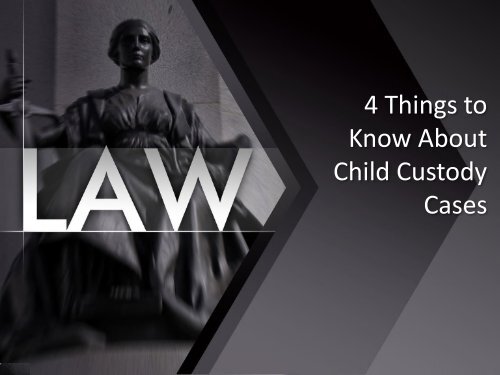Lynette Boggs Perez | Things to Know About Child Custody Cases
Going through a divorce is definitely a challenging task, but the big challenge is often the battle over the custody of children. In most cases, both parents are named joint managing conservators of the child or children. The battle, however, is usually over the designation of which conservator will have the exclusive right to determine where the child will live. Although divorce is a frequent setting for these types of battles, they happen in all types of scenarios.
Going through a divorce is definitely a challenging task, but the big challenge is often the battle over the custody of children. In most cases, both parents are named joint managing conservators of the child or children. The battle, however, is usually over the designation of which conservator will have the exclusive right to determine where the child will live. Although divorce is a frequent setting for these types of battles, they happen in all types of scenarios.
Create successful ePaper yourself
Turn your PDF publications into a flip-book with our unique Google optimized e-Paper software.
4 <strong>Things</strong> <strong>to</strong><br />
<strong>Know</strong> <strong>About</strong><br />
<strong>Child</strong> Cus<strong>to</strong>dy<br />
<strong>Cases</strong>
Going through a divorce is definitely a challenging task, but the big<br />
challenge is often the battle over the cus<strong>to</strong>dy of children. In most cases,<br />
both parents are named joint managing conserva<strong>to</strong>rs of the child or<br />
children. The battle, however, is usually over the designation of which<br />
conserva<strong>to</strong>r will have the exclusive right <strong>to</strong> determine where the child will<br />
live. Although divorce is a frequent setting for these types of battles, they<br />
happen in all types of scenarios. When a child is born <strong>to</strong> unmarried<br />
parents, there often can be cus<strong>to</strong>dy battles and they often have a tie <strong>to</strong> a<br />
petition filed for child support or when one of the parents begins another<br />
relationship. A cus<strong>to</strong>dy dispute can also arise when the child has been left<br />
in the care, cus<strong>to</strong>dy, and control of a third party = such as a grandparent –<br />
and that individual files a lawsuit seeking <strong>to</strong> be named the conserva<strong>to</strong>r of<br />
that child or children.<br />
When both the parents (or relatives) are unable <strong>to</strong> make an amicable<br />
decision regarding the best interests of their child or children cus<strong>to</strong>dy, they<br />
usually end up in court. Before filing a child cus<strong>to</strong>dy case it is important <strong>to</strong><br />
understand how the legal system actually works. So, let’s find out a few<br />
best tips that can make you win a child cus<strong>to</strong>dy case with the experienced<br />
at<strong>to</strong>rney and media<strong>to</strong>r <strong>Lynette</strong> <strong>Boggs</strong>-<strong>Perez</strong>.
<strong>Child</strong> Cus<strong>to</strong>dy Evaluations<br />
In most cases in which there is a dispute as <strong>to</strong> which parent should be named the primary conserva<strong>to</strong>r of the<br />
child, the judge will likely order a <strong>Child</strong> Cus<strong>to</strong>dy Study. This study is conducted by a licensed social worker or child<br />
psychologist who will ultimately prepare a report for the court. Hence, your lifestyle and home environment are<br />
something that will fac<strong>to</strong>r in<strong>to</strong> the final decision by the judge. If you’ve been an absentee parent and all of a<br />
sudden you start showing up <strong>to</strong> avoid paying child support is something that will be obvious <strong>to</strong> the child cus<strong>to</strong>dy<br />
evaluate. If you have other relatives living in your home, know that they <strong>to</strong>o will be a part of this evaluation and<br />
the court will want <strong>to</strong> know if these other individuals have criminal and/or child protection backgrounds. The cost<br />
of a child cus<strong>to</strong>dy evaluation can run between $1500 <strong>to</strong> $2500 and are typically ordered <strong>to</strong> be split between the<br />
two parties involved in the cus<strong>to</strong>dy dispute.
Older children can share their wishes with<br />
the judge<br />
In Texas, children who are at least 12 years of<br />
age can have a say in where they live, but a<br />
judge does not have <strong>to</strong> follow the child’s<br />
wishes. It is improper <strong>to</strong> assume or <strong>to</strong> tell a child<br />
they get <strong>to</strong> decide where they will live once they<br />
turn 12. Once your child turns 18 and is a legal<br />
adult, then a cus<strong>to</strong>dy order does not apply, and<br />
they can decide where <strong>to</strong> live.<br />
The judge can’t interview the child in chambers<br />
in a jury trial on the issue of which parent should<br />
decide where the child primarily lives. In a nonjury<br />
trial, it is up <strong>to</strong> the judge <strong>to</strong> decide whether<br />
or not <strong>to</strong> permit the at<strong>to</strong>rneys <strong>to</strong> be present at<br />
the interview. If either party requests, the judge<br />
must have a court reporter in the judge’s office<br />
<strong>to</strong> record the interview with the child. The<br />
parents are not allowed in the judge’s office<br />
during the interview.
Consult A <strong>Child</strong><br />
Psychologist<br />
If your child has been seeing a<br />
psychologist for any reason,<br />
that professional should give<br />
testimony in the cus<strong>to</strong>dy<br />
merits a hearing. Ultimately<br />
the judge will make a decision<br />
not based on what is in your<br />
best interests as a parent, but<br />
what is in the best interests of<br />
the child. A child psychologist<br />
can give an accurate and<br />
honest assessment of the<br />
child and his or her needs.
Consult an Experienced<br />
At<strong>to</strong>rney<br />
At the time of cus<strong>to</strong>dy disputes, both parents should choose a child cus<strong>to</strong>dy<br />
lawyer for help. No matter if the cus<strong>to</strong>dy disagreement is part of an existing<br />
divorce process or between parents who never married. Not every at<strong>to</strong>rney<br />
experienced in family law and child cus<strong>to</strong>dy matters. Therefore, it is<br />
necessary <strong>to</strong> find a lawyer like <strong>Lynette</strong> <strong>Boggs</strong>-<strong>Perez</strong> who specializes in child<br />
cus<strong>to</strong>dy and family law matters in order <strong>to</strong> make sure that you are being<br />
properly represented.
Bot<strong>to</strong>m Line<br />
So, these are the few tips that will help you in your<br />
child cus<strong>to</strong>dy case. You have <strong>to</strong> consider every detail<br />
during the process. Therefore, do your homework<br />
properly before you file a child cus<strong>to</strong>dy case. It will<br />
increase your chances of having a favorable outcome.





